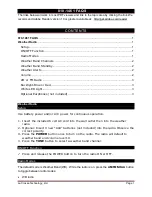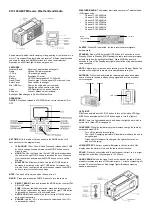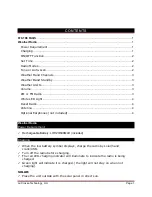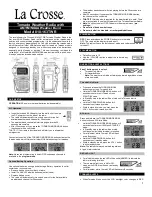
16
II.
THE REMOTE WIND SPEED SENSOR
The remote wind speed sensor can be mounted two ways:
•
With the use of screws
•
Using nylon straps
A.
MOUNTING WITH SCREWS
1)
Unlock the mounting bracket from the remote wind speed sensor leaving the wire going through the
bracket.
2)
Place the mounting bracket over the desired location.
3)
Through the two screw holes of the bracket, mark the mounting surface with a pencil.
4)
Screw the mounting bracket onto the mounting surface. Ensure that the screws are tight against the
bracket.
5)
Slide the remote wind speed sensor onto the bracket making sure to lock it in place.
B.
MOUNTING WITH NYLON STRAPS
1)
Unlock the mounting bracket from the remote wind
speed sensor leaving the wire going through the
bracket.
2)
Place two nylon straps through the slots on the
mounting bracket.
3)
Place the remote wind speed sensor in your desired
location.
4)
Fasten the two nylon straps securely around the
mounting location.
5)
Slide the remote wind speed sensor onto the bracket
making sure to lock it in place.
III.
THE INDOOR WEATHER STATION
1)
Fix a screw (not included) into the desired wall, leaving approximately 3/16 of an inch (5mm)
extended from the wall.
2)
Place the indoor weather station onto the screw using the hanging hole on the backside.
3)
Gently pull the indoor weather station down to lock the screw into place.
TROUBLESHOOTING
NOTE:
For problems not solved, please contact La Crosse Technology.
Problem:
No reception of WWVB time signal.
Solution:
1) Wait overnight for signal.
2) Be sure indoor weather station is at least 6 feet from any electrical devices, such as televisions, computers, or other radio-
controlled clocks.
3) Remove batteries for five minutes, reinsert and leave the unit alone overnight without pressing buttons.
4) If there are still problems, contact La Crosse Technology.
Problem:
Hour is incorrect (minute and date are correct).
Solution:
Be sure correct time zone and daylight saving time settings are selected.
Problem:
The LCD is faint.
Solution:
1) Set the LCD contrast to a higher number.
2) Replace the batteries
Problem:
No outdoor temperature/humidity and/or wind speed is displayed.
Solution:
1) Disconnect the cable from the remote wind speed sensor, then reinsert making sure the cable clicks in place.
2) Remove all batteries, reinsert into remote temperature/humidity sensor first, then the indoor weather station.
3) Place the remote temperature/humidity sensor closer to the display.
4) Be sure all batteries are fresh.




































